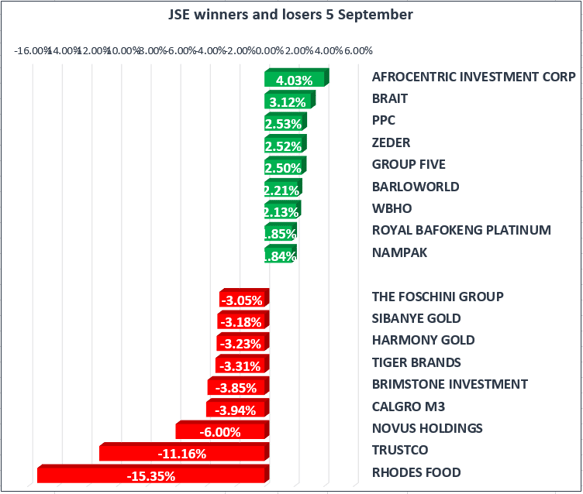The JSE followed global markets and closed lower on Tuesday, while economic data indicated that GDP grew by more than expected in the second quarter.
The All Share Index slipped 0.30% followed by the Top 40 edging 0.31% down. All major indices closed in the red with the gold index falling 2.37%, resources 0.33%, industrials 0.37% and financials 0.11%.
The economy regained some lost ground and grew by more than expected in the second quarter, with real GDP growing by a seasonally adjusted annualised 2.5%, after shrinking by 0.6% in the first quarter.
The economy has thus emerged from the recession in the second quarter – with the recovery driven by a boost in agriculture, continued growth in mining and a rebound in value added by finance, real estate and business service. On the expenditure side, the support came mainly from a rebound in household and government consumption expenditure as well as a much stronger net export position as the recovery in export volumes outpaced that of imports. However, inventory holdings declined and total fixed capital formation relapsed.
The rand strengthened on the news by 0.87% and closed the trading session at R12.85 against the dollar. Inflation remains vulnerable to rand weakness
Household consumption expenditure rose strongly by 4,7% in the second quarter, contributing 2,8% alone to total expenditure. In sharp contrast, the underlying slump in fixed investment activity continued to hurt construction activity, where value added fell by a further 0,5%. Finally, value added by general government shrunk by 0,6%, probably undermined by mounting budget constraints and the need to reduce the public-sector debt burden.
Gross fixed capital formation (GFCF) contracted by 2,6% in the second quarter, as business confidence remained weak due to the uncertain policy and political environment, which prompted the private sector to delay investment plans. The largest contributor to the decline was residential building, which dropped by 13%.
Rhodes food group took a 15.35% dive to R19.75 after the company reported that international turnover had declined 21.89% in the 10 months to end-July. The company trading statement also indicated that headline earnings per share were expected to be between 25% and 35% lower.
Gold prices remained steady at $1335/Oz as demand for safe-haven assets remained strong in the wake of North Korea's most powerful nuclear test to date. Geopolitical risks tend to boost demand for safe havens such as gold, which is considered a good store of value during volatility in other markets.
Oil prices gained 2.33% to $53.56/bbl as US refineries only recently started to resume operations.










